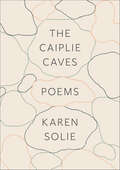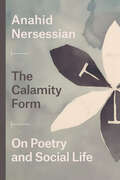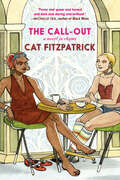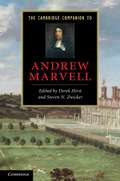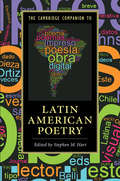- Table View
- List View
The Caiplie Caves: Poems
by Karen SolieThe award-winning poet Karen Solie’s striking fifth collection of poetry blends the story of a seventh-century monk with contemporary themes of economic class, environmentalism, and solitude in an ever-connected worldif one asks for a signmust one accept what’s given?Ethernan, an Irish missionary in the seventh century, retreated to the Caiplie Caves on the eastern coast of Scotland to consider life as a hermit. In The Caiplie Caves, Karen Solie’s fifth collection of poems, short-listed for the T. S. Eliot Prize, Solie inhabits a figure inspired by Ethernan, a man torn between the communal and the contemplative. His story is remarkable for the mysticism embedded in the ordinary; as Solie writes in her preface, Ethernan is not known for supernatural feats, but “is said to have survived for a very long time on bread and water.” Interwoven with the voice of this figure are poems whose subjects orbit the physical location of the caves and join the sharply contemporary to the mythic past: the fall of a coal-fired power station; a “druid shouting astrology” outside a liquor store, putting “the Ambien in ambience”; seabirds “frontloaded with military tech”; the dichotomous nature of the stinging nettle. These are meditations on the crisis of time and change, on class, power, and belief. Above all, these are ambitious and exhilarating poems from one of today’s most gifted poetic voices.
The Calamity Form: On Poetry and Social Life
by Anahid NersessianRomanticism coincided with two major historical developments: the Industrial Revolution, and with it, a turning point in our relationship to the earth, its inhabitants, and its climate. Drawing on Marxism and philosophy of science, The Calamity Form shines new light on Romantic poetry, identifying a number of rhetorical tropes used by writers to underscore their very failure to make sense of our move to industrialization. Anahid Nersessian explores works by Friedrich Hölderlin, William Wordsworth, John Keats, and others to argue that as the human and ecological costs of industry became clear, Romantic poetry adopted formal strategies—among them parataxis, the setting of elements side by side in a manner suggestive of postindustrial dissonance, and apostrophe, here an address to an absent or vanishing natural environment—as it tried and failed to narrate the calamities of capitalism. These tropes reflect how Romantic authors took their bewilderment and turned it into a poetics: a theory of writing, reading, and understanding poetry as an eminently critical act. Throughout, Nersessian pushes back against recent attempts to see literature as a source of information on par with historical or scientific data, arguing instead for an irreducibility of poetic knowledge. Revealing the ways in which these Romantic works are of their time but not about it, The Calamity Form ultimately exposes the nature of poetry’s relationship to capital—and capital’s ability to hide how it works.
The Call-Out: A Novel in Rhyme
by Cat FitzpatrickA fast-paced, debut tragicomedy of manners written in verse about queer (mostly trans) women that is funny, literary, philosophical, witty, sometimes bitchy and sometimes heartbreaking.Anvi, Kate, Bette, Keiko, Gaia, and Day are six queer, mostly trans women surviving and thriving in Brooklyn. Visiting all the fixtures of fashionable 21st century queer society—picnics, literary readings, health conferences, drag shows, punk houses, community accountability processes, Grindr hookups—The Call-Out also engages with pressing questions around economic precarity, sexual consent, racism in queer spaces, and feminist theory, in the service of asking what it takes to build, or destroy, a marginalized community. A novel written in verse, The Call-Out recalls the Russian literary classic Eugene Onegin, but instead of 19th century Russian aristocrats crudely solved their disagreements with pistols, the participants in this rhyming drama have developed a more refined weapon, the online call-out, a cancel-culture staple. In this passionate tangle of modern relationships, where a barbed tweet can be as dangerous as the narrator&’s bon-mots, Cat Fitzpatrick has fashioned a modern novel of manners that gives readers access to a vibrant cultural underground.
The Cambridge Companion to American Poetry since 1945
by Jennifer AshtonThe extent to which American poetry reinvented itself after World War II is a testament to the changing social, political, and economic landscape of twentieth-century American life. Registering an important shift in the way scholars contextualize modern and contemporary American literature, this Companion explores how American poetry has documented and, at times, helped propel the literary and cultural revolutions of the past sixty-five years. Offering authoritative and accessible essays from fourteen distinguished scholars, the Companion sheds new light on the Beat, Black Arts, and other movements while examining institutions that govern poetic practice in the United States today. The text also introduces seminal figures like Sylvia Plath, John Ashbery, and Gwendolyn Brooks while situating them alongside phenomena such as the "academic poet" and popular forms such as spoken word and rap, revealing the breadth of their shared history. Students, scholars, and readers will find this Companion an indispensable guide to post-war and late twentieth-century American poetry.
The Cambridge Companion to American Poets: The Cambridge Companion to American Poets
by Mark RichardsonThe Cambridge Companion to American Poets brings together thirty-one essays on some fifty-four American poets, spanning nearly 400 years, from Anne Bradstreet to contemporary performance poetry. This book also examines such movements in American poetry as modernism, the Harlem (or New Negro) Renaissance, 'confessional' poetry, the Black Mountain School, the New York School, the Beats, and L=A=N=G=U=A=G=E poetry. Its reputable host of contributors approach American poetry from perspectives as diverse as the poetry itself. The result is a Companion concise enough to be read with pleasure yet expansive enough to do justice to the many traditions American poets have modified, inaugurated, and made their own.
The Cambridge Companion to Andrew Marvell
by Derek Hirst Steven N. ZwickerAndrew Marvell is one of the greatest English lyric poets of the seventeenth century and one of its leading polemicists. This Companion brings a set of fresh questions and perspectives to bear on the varied career and diverse writings of a remarkable writer and elusive man. Drawing on important new editions of Marvell's poetry and of his prose, scholars of both history and literature examine Marvell's work in the contexts of Restoration politics and religion, and of the seventeenth-century publishing world in both manuscript and print. The essays, individually and collectively, address Marvell within his literary and cultural traditions and communities; his almost prescient sense of the economy and ecology of the country; his interest in visual arts and architecture; his opaque political and spiritual identities; his manners in controversy and polemic; the character of his erotic and transgressive imagination and his biography, still full of intriguing gaps.
The Cambridge Companion to Baudelaire
by Rosemary LloydCharles Baudelaire's place among the great poets of the Western world is undisputed, and his influence on the development of poetry since his lifetime has been enormous. In this Companion, essays by outstanding scholars illuminate Baudelaire's writing both for the lay reader and for specialists. In addition to a survey of his life and a study of his social context, the volume includes essays on his verse and prose, analyzing the extraordinary power and effectiveness of his language and style, his exploration of intoxicants like wine and opium, and his art and literary criticism. The volume also discusses the difficulties, successes and failures of translating his poetry and his continuing power to move his readers. Featuring a guide to further reading and a chronology, this Companion provides students and scholars of Baudelaire and of nineteenth-century French and European literature with a comprehensive and stimulating overview of this extraordinary poet.
The Cambridge Companion to British Poetry, 1945–2010.: The Cambridge Companion to British Poetry, 1945–2010
by Edward LarrissyThe Cambridge Companion to British Poetry, 1945–2010 brings together sixteen essays that explore the full diversity of British poetry since the Second World War, a period of significant achievement in which varied styles and approaches have flourished. As a comprehensive critical, literary-historical and scholarly guide, this Companion offers not only new readings of a wide range of poets but a detailed account of the contexts in which their verse was written and received. Focusing on famous and neglected names alike, from Dylan Thomas to John Agard, leading scholars provide readers with insight into the ongoing importance and profundity of post-war poetry.
The Cambridge Companion to British Romantic Poetry
by James Chandler Maureen N. MclaneMore than any other period of British literature, Romanticism is strongly identified with a single genre. Romantic poetry has been one of the most enduring, best loved, most widely read and most frequently studied genres for two centuries and remains no less so today. This Companion offers a comprehensive overview and interpretation of the poetry of the period in its literary and historical contexts. The essays consider its metrical, formal, and linguistic features; its relation to history; its influence on other genres; its reflections of empire and nationalism, both within and outside the British Isles; and the various implications of oral transmission and the rapid expansion of print culture and mass readership. Attention is given to the work of less well-known or recently rediscovered authors, alongside the achievements of some of the greatest poets in the English language: Wordsworth, Coleridge, Blake, Scott, Burns, Keats, Shelley, Byron and Clare.
The Cambridge Companion to Byron
by Drummond BoneByron's life and work have fascinated readers around the world for two hundred years, but it is the complex interaction between his art and his politics, beliefs and sexuality that has attracted so many modern critics and students. In three sections devoted to the historical, textual and literary contexts of Byron's life and times, these specially commissioned essays by a range of eminent Byron scholars provide a compelling picture of the diversity of Byron's writings. The essays cover topics such as Byron's interest in the East, his relationship to the publishing world, his attitudes to gender, his use of Shakespeare and eighteenth-century literature, and his acute fit in a post-modernist world. This Companion provides an invaluable resource for students and scholars, including a chronology and a guide to further reading.
The Cambridge Companion to Coleridge
by Lucy NewlynSamuel Taylor Coleridge is one of the most influential, as well as one of the most enigmatic, of all Romantic figures. The possessor of a precocious talent, he dazzled contemporaries with his poetry, journalism, philosophy and oratory without ever quite living up to his early promise, or overcoming problems of dependence and drug addiction. The Cambridge Companion to Coleridge does full justice to the many facets of Coleridge's life and work. Specially commissioned essays focus on his major poems, including The Rime of the Ancient Mariner and Christabel, his notebooks, and his major work of non-fiction the Biographia Literaria. Attention is given to his role as talker, journalist, critic, and philosopher, his politics, his religion, and his reputation in his own times and afterwards. A chronology and guides to further reading complete the volume, making this an indispensable guide to Coleridge and his work.
The Cambridge Companion to Contemporary Irish Poetry
by Matthew CampbellIrish poets have produced some of the most exciting poetry in contemporary literature over the last fifty years. In addition to providing a unique introduction to major figures such as Seamus Heaney, this Companion introduces the reader to significant precursors such as Louis MacNeice or Patrick Kavanagh, as well as vital contemporaries and successors (including among others, Thomas Kinsella, Paul Muldoon and Nuala Ni Dhomhnaill. ) The volume includes a chronology and guide to further reading and will prove invaluable to students and teachers.
The Cambridge Companion to Eighteenth-Century Poetry
by John SitterThe Cambridge Companion to Eighteenth-Century Poetry analyzes major premises, preoccupations, and practices of English poets writing from 1700 to the 1790s. These specially-commissioned essays avoid familiar categories and single-author approaches to look at the century afresh. Chapters consider such large poetic themes as nature, the city, political passions, the relation of death to desire and dreams, appeals to an imagined future, and the meanings of â sensibility'. Other chapters explore historical developments such as the connection between poetic couplets and conversation, the conditions of publication, changing theories of poetry and imagination, growing numbers of women poets and readers, the rise of a self-consciously national tradition, and the place of lyric poetry in thought and practice. The essays are well supported by supplementary material including a chronology of the period and detailed guides to further reading. Altogether the volume provides an invaluable resource for scholars and students.
The Cambridge Companion to Elizabeth Bishop
by Angus Cleghorn Jonathan EllisElizabeth Bishop is increasingly recognized as one of the twentieth century's most important and original poets. Initially celebrated for the minute detail of her descriptions, what John Ashbery memorably called her thinginess, Bishop's reputation has risen dramatically since her death, in part due to the publication of new work, including letters, stories, and visual art, as well as a controversial volume of uncollected poems, drafts, and fragments. This Companion engages with key debates surrounding the interpretation and reception of Bishop's published and unpublished writing in relation to questions of biography, the natural world, and politics. Individual chapters focus on well-known texts such as North & South, Questions of Travel, and Geography III, while offering fresh readings of the significance of Nova Scotia, Massachusetts, and Brazil to Bishop's life and work. With a chronology and guide to further reading, this volume explores the full range of Bishop's artistic achievements and the extent to which the posthumous publications have contributed to her enduring popularity.
The Cambridge Companion to Emily Dickinson
by Wendy MartinEmily Dickinson, one of the most important American poets of the nineteenth century, remains an intriguing and fascinating writer. The Cambridge Companion to Emily Dickinson includes eleven new essays by accomplished Dickinson scholars. They cover Dickinson's biography, publication history, poetic themes and strategies, and her historical and cultural contexts. As a woman poet, Dickinson's literary persona has become incredibly resonant in the popular imagination. She has been portrayed as singular, enigmatic, and even eccentric. At the same time, Dickinson is widely acknowledged as one of the founders of American poetry, an innovative pre-modernist poet as well as a rebellious and courageous woman. This volume introduces new and practised readers to a variety of critical responses to Dickinson's poetry and life, and provides several valuable tools for students, including a chronology and suggestions for further reading.
The Cambridge Companion to English Poetry Donne to Marvell
by Thomas N. CornsEnglish poetry in the first half of the seventeenth century is an outstandingly rich and varied body of verse, which can be understood and appreciated more fully when set in its cultural and ideological context. This student Companion, consisting of fourteen new introductory essays by scholars of international standing, informs and illuminates the poetry by providing close reading of texts and an exploration of their background. There are individual studies of Donne, Jonson, Herrick, Herbert, Carew, Suckling, Lovelace, Milton, Crashaw, Vaughan and Marvell. More general essays describe the political and religious context of the poetry, explore its gender politics, explain the material circumstances of its production and circulation, trace its larger role in the development of genre and tradition, and relate it to contemporary rhetorical expectation. Overall the Companion provides an indispensable guide to the texts and contexts of early-seventeenth-century English poetry.
The Cambridge Companion to English Poets
by Claude RawsonThis volume provides lively and authoritative introductions to twenty-nine of the most important British and Irish poets from Geoffrey Chaucer to Philip Larkin. The list includes, among others, Shakespeare, Donne, Milton, Wordsworth, Browning, Yeats and T. S. Eliot, and represents the tradition of English poetry at its best. Each contributor offers a new assessment of a single poet's achievement and importance, with readings of the most important poems. The essays, written by leading experts, are personal responses, written in clear, vivid language, free of academic jargon, and aim to inform, arouse interest, and deepen understanding.
The Cambridge Companion to John Donne
by Achsah GuibboryThe Cambridge Companion to John Donne, first published in 2006, introduces students (undergraduate and graduate) to the range, brilliance, and complexity of John Donne. Sixteen essays, written by an international array of leading scholars and critics, cover Donne's poetry (erotic, satirical, devotional) and his prose (including his Sermons and occasional letters). Providing readings of his texts and also fully situating them in the historical and cultural context of early modern England, these essays offer the most up-to-date scholarship and introduce students to the current thinking and debates about Donne, while providing tools for students to read Donne with greater understanding and enjoyment. Special features include a chronology; a short biography; essays on political and religious contexts; an essay on the experience of reading his lyrics; a meditation on Donne by the contemporary novelist A. S. Byatt; and an extensive bibliography of editions and criticism.
The Cambridge Companion to John Dryden
by Steven N. ZwickerJohn Dryden, Poet Laureate to Charles II and James II, was one of the great literary figures of the late seventeenth century. This Companion provides a fresh look at Dryden's tactics and triumphs in negotiating the extraordinary political and cultural revolutions of his time. The newly commissioned essays introduce readers to the full range of his work as a poet, as a writer of innovative plays and operas, as a purveyor of contemporary notions of empire, and most of all as a man intimate with the opportunities of aristocratic patronage as well as the emerging market for literary gossip, slander and polemic. Dryden's works are examined in the context of seventeenth-century politics, publishing and ideas of authorship. A valuable resource for students and scholars, the Companion includes a full chronology of Dryden's life and times and a detailed guide to further reading.
The Cambridge Companion to Latin American Poetry (Cambridge Companions to Literature)
by Stephen M. HartThe Cambridge Companion to Latin American Poetry provides historical context on the evolution of the Latin American poetic tradition from the sixteenth century to the present day. <P><P>It is organized into three parts. Part I provides a comprehensive, chronological survey of Latin American poetry and includes separate chapters on Colonial poetry, Romanticism/modernism, the avant-garde, conversational poetry, and contemporary poetry. Part II contains six succinct essays on the major figures Sor Juana Inés de la Cruz, Gabriela Mistral, César Vallejo, Pablo Neruda, Carlos Drummond de Andrade, and Octavio Paz. Part III analyses specific and distinctive trends within the poetic canon, including women's, LGBT, Quechua, Afro-Hispanic, Latino/a and New Media poetry. This Companion also contains a guide to further reading as well as an essay on the best English translations of Latin American poetry. It will be a key resource for students and instructors of Latin American literature and poetry.<P> Proposes a comprehensive and up-to-date view of Latin American poetry, including evaluations of twenty-first-century Latin American poetry; Contains a special section on modern trends in Latin American poetry, such as LGBT, Latino/a and New Media poetry; This book has a broader coverage than other companions to Latin American poetry - several essays explore Brazilian as well as Spanish-American poetry.
The Cambridge Companion to Latin Love Elegy
by Thea S. ThorsenLatin love elegy is one of the most important poetic genres in the Augustan era, also known as the golden age of Roman literature. This volume brings together leading scholars from Australia, Europe and North America to present and explore the Greek and Roman backdrop for Latin love elegy, the individual Latin love elegists (both the canonical and the non-canonical), their poems and influence on writers in later times. The book is designed as an accessible introduction for the general reader interested in Latin love elegy and the history of love and lament in Western literature, as well as a collection of critically stimulating essays for students and scholars of Latin poetry and of the classical tradition.
The Cambridge Companion to Lucretius
by Philip Hardie Stuart GillespieLucretius' didactic poem De rerum natura ('On the Nature of Things') is an impassioned and visionary presentation of the materialist philosophy of Epicurus, and one of the most powerful poetic texts of antiquity. After its rediscovery in 1417 it became a controversial and seminal work in successive phases of literary history, the history of science, and the Enlightenment. In this 2007 Cambridge Companion experts in the history of literature, philosophy and science discuss the poem in its ancient contexts and in its reception both as a literary text and as a vehicle for progressive ideas. The Companion is designed both as an accessible handbook for the general reader who wishes to learn about Lucretius, and as a series of stimulating essays for students of classical antiquity and its reception. It is completely accessible to the reader who has only read Lucretius in translation.
The Cambridge Companion to Milton
by Dennis DanielsonAn accessible, helpful guide for any student of Milton, whether undergraduate or graduate, introducing readers to the scope of Milton's work, the richness of its historical relations, and the range of current approaches to it. This second edition contains several new and revised essays, reflecting increasing emphasis on Milton's politics, the social conditions of his authorship and the climate in which his works were published and received, a fresh sense of the importance of his early poems and Samson Agonistes, and the changes wrought by gender studies on the criticism of the previous decade. By contrast with other introductions to Milton, this Companion gathers an international team of scholars, whose informative, stimulating and often argumentative essays will provoke thought and discussion in and out of the classroom. The Companion's reading lists and extended bibliography offer readers the necessary tools for further informed exploration of Milton studies.
The Cambridge Companion to Modern American Poetry
by Walter KalaidjianThe Cambridge Companion to Modern American Poetry comprises original essays by nineteen distinguished scholars. It offers a critical overview of major and emerging American poets of the twentieth century, in addition to critical accounts of the representative schools, movements, regional settings, archival resources, and critical reception that define modern American poetry. The Companion stretches the narrow term of "literary modernism" - which encompasses works published from approximately 1890 to 1945 - to include a more capacious and usable account of American poetry's evolution from the twentieth century to the present. The essays collected here seek to account for modern American verse against the contexts of broad political, social, and cultural fields and forces. This volume gathers together major voices that represent the best in contemporary critical approaches and methods.
The Cambridge Companion to Modernist Poetry
by Alex Davis Lee M. JenkinsThis 2007 Companion offers the most comprehensive overview available of modernist poetry, its forms, its major authors and its contexts. The first part explores the historical and cultural contexts and sexual politics of literary modernism and the avant garde. The chapters in the second part concentrate on individual authors and movements, while the concluding part offers a comprehensive overview of the early reception and subsequent canonisation of modernist poetry. As well as insightful readings of canonical poets, the Companion features extended discussions of poets whose importance is now being increasingly recognised, such as Mina Loy, poets of the Harlem Renaissance, and postcolonial poets in the Caribbean, Africa and India. While modernist poets are often thought of as difficult, these essays will help students to understand and enjoy their experimental, playful and fascinating responses to contemporary social and cultural change and their dialogue with the arts and with each other.
